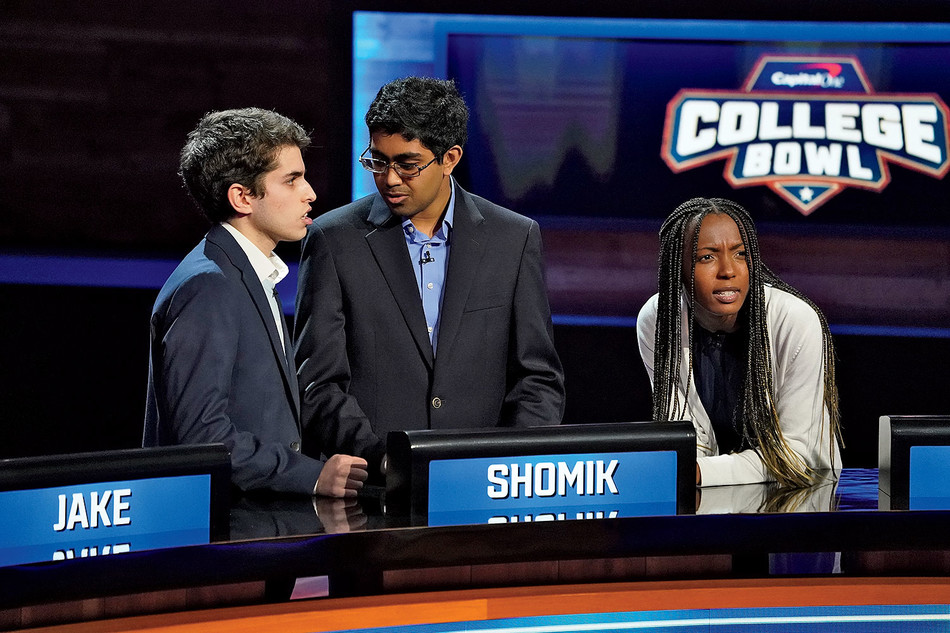Columbia is used to being an underdog in football, but College Bowl is a different sort of hard-hitting sport. An intercollegiate quiz show in which players tackle questions rather than each other, the program debuted on NBC radio in 1953 — the first match pitted the Columbia Lions against the Northwestern Wildcats — and aired on television from 1959 to 1970 as General Electric College Bowl. Last year, NBC revived the show (now sponsored by Capital One), and Columbia was one of twelve schools invited to participate in the 2021 tournament.
The producers auditioned potential contestants on Zoom, and four undergrads made the cut: Shomik Ghose (the team captain), Tamarah Wallace, Jake Fisher, and alternate Addis Boyd. The students, who didn’t know each other, flew to Los Angeles, where they did some team bonding before going to the studio to tape the show. Ghose, a football fan, was thrilled to meet the College Bowl emcees: former NFL quarterback Peyton Manning and his older brother, Cooper. The Manning brothers brought gridiron cred to a rah-rah competition whose stakes were dizzyingly high: the grand prize was $125,000 in scholarships for each member of the winning team, while the runners-up would receive $25,000 apiece. The Lions, wearing thinking caps rather than helmets, clawed their way past Morehouse and Tennessee to reach the semifinals against Auburn.
That’s when things got hairy. Early in the Auburn match, the Lions fell behind by an eye-popping margin of 240–10. Their only chance for survival was the two-minute drill, the part of the game where most of the points are scored, and where the Lions had excelled in their previous matches. “The segment is like a verbal race,” says Ghose. Peyton Manning reads as many questions as he can in 120 seconds, while the team captain, with counsel from his teammates, blurts out as many answers as possible.
The topic was history: “In 1809, Napoleon arranged for the nullification of his marriage to whom?” “Josephine!” “What January 1776 pamphlet by Thomas Paine” — “Common Sense!” “Robert E. Lee surrendered to the Union in what Virginia village?” “Appomattox!” After Auburn took its turn and the dust cleared, the Lions were on top, 735–695. “The killer instinct really kicked in,” says Ghose. It was an astonishing reversal, and Columbia, which hadn’t won the tournament since 1966, advanced to the finals.
Waiting for them were the Trojans of USC. It was New York versus Los Angeles, or, as Cooper Manning put it, “pizza versus avocado toast.” High-profile Columbians cheered on the Lions in video clips that punctuated the program: University provost Mary Boyce, Columbia College dean James Valentini, economics professor Sunil Gulati ’86GSAS, sports commentator Max Kellerman ’98CC, and former secretary of state Madeleine Albright ’76GSAS, ’95HON, who called the three contestants “the future of Columbia.”
The final match, which featured topics such as botany, women in fiction, world music, African-American authors, and conflict resolution, was a squeaker. Once again, it all came down to the two-minute drill. The Trojans went first, racking up points. The Lions, needing fifteen correct answers in two minutes in order to win, chose the category “liberal arts.” “We have the Core Curriculum at Columbia, we do our humanities,” Ghose explained to the hosts. The clock started, and in the heat of battle, the Lions lost track of the tally. With twenty-two seconds left, Peyton asked how many electoral votes the states of Vermont and Wyoming have. “Three!” Ghose yelled. There was a bell-like sound, and Peyton hit the brakes. “And that is it,” he said. “Columbia has won the College Bowl championship.”
The Lions were in shock. On national television, with everything on the line, they had conquered the field. The Manning brothers brought over the College Bowl Cup along with symbolic checks for $125,000.
Back on campus, Ghose, Wallace, and Fisher got a small taste of celebrity. “A lot of people stop me and ask, ‘Are you the guy on TV?’” Ghose says. As usual, he has the correct answer.
This article appears in the Winter 2021-22 print edition of Columbia Magazine with the title "Head-to-Head Competition."



